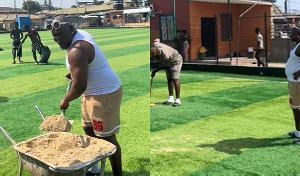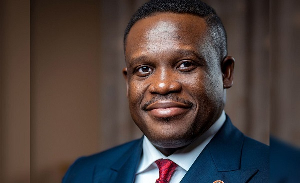By Kwame Okoampa-Ahoofe, Jr., Ph.D.
Garden City, New York
June 22, 2015
E-mail: okoampaahoofe@optimum.net
Ten-thousand shoes/sandals for "deprived" Ghanaian students are a good idea, albeit woefully inadequate. I am even tempted to call it a "provocative teaser," if also because one can be quite certain that the number of elementary and secondary school pupils/students who walk barefooted to school every day of the week, is far in excess of 10,000. It is at least something on the order of a couple millions. Well, we are told that this was one of the myriad promises made by President John Dramani Mahama sometime May of last year, during a working tour of a shoe factory owned by the Ghana Armed Forces located in the Asante regional capital of Kumasi (See "10,000 Free Shoes For Students Ready" Citifmonline.com / Ghanaweb.com 6/22/15).
It definitely makes for scoring cheap political points in the short term; but as a long-term solution to the behemoth problems besetting our educational system, it far pales in significance. And this is why I find myself wholly in agreement with Mr. K. B. Asante, the 90-something-year-old retired politician and diplomat, who sharply criticized the decision as one that woefully failed to take the country's fragile economic capacity into consideration. I am also sure that the cost of the shoes/sandals, earmarked for free distribution to students in "deprived communities" runs into several million cedis. Which makes it more worthwhile to have been invested in textbook and teaching-equipment development. For students are far more likely to be motivated to regularly attend school, if they can also be assured of the generous availability of teaching and learning materials.
The Mahama approach to educational development is clearly cosmetic, as the focus seems to be uncomfortably and facilely on the provision of school uniforms and footware, instead of feeding the brains of these talented and promising students for the sustained development of Ghana's future. Indeed, the primary problem of the average Ghanaian student and his/her parent is school fees, not what to wear to school. In other words, if tuition fees could be made free throughout the country, you can bet on an exponential increase in both the percentage of student enrollment as well as the rate of attendance.
Even as other critics have already underscored, supplying students with shoes and uniforms unhealthily takes away parental responsibility for the children that they consciously, for the most part, consented to bring into the world. In some instances, we learn that even basic personal hygiene toileteries like menstrual pads have had to be supplied to female students in some parts of the country, in order to encourage them to attend school. What we need to measure is to what extent students supplied with free sanitary pads either outperform or perform as well as students not supplied with the same, regardless of whether students not supplied with sanitary pads can be classified as either "deprived" or "undeprived." This is what a foresighted educational policy ought to be about. It is not an infantile matter of guesswork, such as President Mahama and his minions would have us believe.
Then also, it would be far better for the distribution of the 10,000 sandals/shoes to be based on the individual needs of students, as determined by headteachers and their staff, rather than whether a student lives in a community or locality arbitrarily defined or designated as either "deprived" or "self-sufficient." For as we all know, communities are not homogeneous for any policymaker to facilely presume to determine precisely who is "deprived" and who is "self-sufficient." A more constructive measurement of need or deprivation could be more objectively based on the incomes of parents and guardians than merely where any of the latter groups of responsible adults reside with their charges.
_____________________________________________________________
Opinions of Monday, 29 June 2015
Columnist: Okoampa-Ahoofe, Kwame














